#Nuremberg guide
Explore tagged Tumblr posts
Text
Travel Guide Nuremberg Germany
#Travel Guide Nuremberg Germany#Travel Guide Nuremberg#Nuremberg Germany#Travel Nuremberg Germany#Guide Nuremberg Germany#Nuremberg#Nurembreg travel Guide#Nuremberg guide#travel#travel guide#guide#article#travelguidearticle#Nuremberg travel#Nuremberg hotel#Germany
1 note
·
View note
Text
"Nuremberg Unveiled: Your Ultimate Guide to Exploring this Historic City in Germany"
Nuremberg Unveiled Introduction: Nuremberg is a city that is famous for its architecture, museums, and historical landmarks. One of the most prominent landmarks in Nuremberg is the Nuremberg Castle, which is a medieval fortress that has stood the test of time for over a thousand years. The castle was once the residence of the Holy Roman Emperors and is now a popular tourist attraction. Another…

View On WordPress
0 notes
Text
The Pocket Guide to Nuremberg's Best Beer

#beer#hiking#bavaria#beer_wanderers#brewery#bier#beerwanderers#beer hiking bavaria#franconia#franken#Pocket Guide to Nuremberg's Best Beer
5 notes
·
View notes
Text
#nuremberg#germany#deutschland#DiscoverGermanyFromHome#visitgermany#germanytourism#Nuernberg_travel#europe#europetrip#europetravel#europe trip#europe travel#VisitEurope#travel#tourism#trips#holidays#vacation#travel tips#travel guide#travelgram#traveltheworld#things to do#things to see#places to go#places to see#places to travel#places to visit#travellover#traveladdict
0 notes
Text
Mann springt auf anfahrenden ICE – der beschleunigt auf 282
Man jumps onto departing ICE train, rides on the outside at 282 km/h
A man from Hungary left the ICE bullet train during a stop at the station of Ingolstadt to smoke a cigarette. The train continued its journey quicker than the man anticipated and before he had finished his cigarette. Desperately, because his luggage was still on the train, the man jumped on the train, holding on to technical installations on the coupler between the two halves of the otherwise smooth train.
Although witnesses immediately reported the incident, it took a while before the train driver was informed, during which time he accelerated the train to 282 km/h (175 mph). After being noticed, the train driver immediately decelerated the train and brought it to a stop at the next station, where a policeman incidentially riding on the train guided the man aboard. At the next regular stop in Nuremberg, the man was handed over to the federal police. It turned out that the man was traveling without a ticket, so he was charged for two offenses: Obtaining a transportation service by fraud, and carrying out an act disrupting train operation.
473 notes
·
View notes
Text
i. Reading Looking For The Good War has, among many other things, I think really helped me to clarify and articulate what I find so disquieting about "Points" as an episode. (Which is not all of it! There are certainly plenty of scenes that I find fascinating and/or enjoyable to watch.) But:
"It is much easier to tell a sentimental war story with a happy ending, in which valor eclipses causes and reconciliation triumphs over everything--a comedy, in other words--than it is to tell another, unsentimental kind of story." (page 89)
This is what it is, exactly--"in which valor eclipses causes and reconciliation triumphs over everything" could more or less be the logline of "Points." This is most egregiously evident to me in the scene of Nazi general's surrender, but the scene where Winters tells the Nazi officer to keep his sidearm is also I think highly indicative of this drive towards reconciliation, however rotten, above all else. And Samet articulates that wonderfully, and articulates as well the cost of this type of narrative:
"Yet sentimentality does more than shape the way we commemorate wars. It informs all those cultural and sociological attitudes in the shadow of which wartime and postwar policies are crafted, and it prevents a more productive and enduring sympathy that, in cooperation with reason, might guide our actions and help us become more careful readers of war's many ambiguities and false seductions." (page 83)
ii. The layers of dislike I have for the Nazi general scene are manifold; the mirroring of Winters and the Nazi general and thereby Easy Company with the Nazi soldiers feels incredibly sinister, perhaps most aggressively so in its weird push to rehabilitate the Nazis as soldiers, and thus to both foreshadow (within the world of the show) and echo (in the world of the audience) the archetypal defense that Nazi higher-ups would put forward at Nuremberg and beyond, that they were just following orders.
iii. The mirroring of Winters and Easy Company with the Nazis is clearly intentional, and somewhat bizarrely explicit ("You've found in one another a bond that exists only in combat among brothers") and maudlin (the panning shots over the Nazi soldiers' faces and wounds), and by the end the urge to parallel the two leaders and the two armies--indeed, to collapse one into the other, in order to make them functionally the same--seems to cause a sort of scriptwriting amnesia about who these words are actually being said by and to. Once again the greater historic context makes this especially chilling, Operation Paperclip being perhaps the most salient point to evoke. (I am also haunted, forever, by a statistic that Michael C. C. Adams cites in The Best War Ever, that a September 1945 survey of American GIs found that 22% believed the Nazi treatment of Jewish people to be justified. Granted, this survey would not have been taken using modern sampling methods, and who knows what the sample size was to begin with or what soldiers in particular were being surveyed. But still.)
iv. The scene leans heavily into the idea of a unique soldierly bond that unites not only each individual army within itself but bonds the two armies together. ("You've found in one another a bond that exists only in combat, among brothers who've shared foxholes, held each other in dire moments, who've seen death and suffered together.") Besides being disquieting for reasons I state above, I think it's notable that the Nazi general's speech emphasizing the brotherhood of soldiers happens directly after the short scene between Winters and Sobel, wherein Winters chides Sobel on a point of military ritual ("We salute the rank, not the man"). Sobel is outside the brotherhood; he doesn't understand how to be a soldier; whereas the Nazis are within the brotherhood, so much so that they are allowed to articulate its terms. (This is egregious no matter what, but becomes all the more so when it is framed as a Jewish man being excluded from the "club" of military brotherhood while WASP Americans and literal Nazis are allowed in.) (Meanwhile, Liebgott occupies a sort of bizarre placement in this scene, there to ventriloquize--indeed, perhaps neutralize, or even legitimize--the Nazi general's words, but not speak for himself.)
v. This gets to another point that Samet makes that stuck out to me, about the inherent tautology of military culture. She quotes William Styron, who in a 1964 review of General Douglas MacArthur's memoir said:
"Anyone who has lived as a stranger for any length of time among professional military men, especially officers, is made gradually aware of something that runs counter to everything one has been taught to believe—and that is that most of these men, far from corresponding to the liberal cliché of the super-patriot, are in fact totally lacking in patriotism. They are not unpatriotic, they simply do not understand or care what patriotism is. [...] A true military man is a mercenary [...] and it is within the world of soldiering that he finds his only home." (Samet quotes Styron on page 233; I'm quoting here from the full review)
The point of being a soldier is to be a soldier; the point of the military is to have a military. She also has this to say--especially saliently, I think, for obvious reasons--about Ambrose, and his perspective specifically in Citizen Soldiers:
"By means of emphasis and convenient omission, Ambrose preserves his focus on unity, not division; right, not wrong; liberation, not subjugation. Paradoxically, given that he makes so much of American idealism, he often subordinates a consideration of causes altogether to a veneration for the magnificence of the army itself. The creation of that army, rather than the victory it made possible, becomes 'the great achievement of the American people and system,' just as the nation's 'greatest nineteenth-century achievement' had been, according to Ambrose, 'the creation of the Army of the Potomac' rather than the end it eventually secured--the abolition of chattel slavery." (page 46)
Here we are back to the first Samet quote from above: valor eclipses causes and reconciliation triumphs over everything. To be a military man--to be part of the club, the brotherhood, the "bond that exists only in combat"--is to "subordinate a consideration of causes altogether to a veneration for the magnificence of the army itself." The country and the cause that the Nazi general and his soldiers fought "bravely, proudly" for become sublimated, while that bravery and pride, stripped of more specific meaning, is extolled. What matters, by the time this scene happens--and it's the last scene in the core section of the episode, followed only by the close of the frame structure with Winters and Nixon and then the baseball scene-cum-epilogue--is not the American cause that Easy Company was fighting for, and certainly not the Nazi atrocities they were fighting against, but rather a reconciliation that views the experience of war as preeminently important. Sobel, who did not experience combat, is dismissed; the Nazi general, who did, is legitimated.
vi. And that, I think, is the core of the message that Band of Brothers promotes. Fandom often refers to the show in passing as propaganda, but I'm not sure that really gets to the heart of what it is, in the end, saying. I would suggest that it's not merely propaganda; it's a recruitment poster. It's not selling truth, justice, and the American way (or if it is, it's doing so only incidentally); it's selling the experience of being in the military as a transformative and ultimately positive one, that unites (a certain subset of) men through the unique crucible of battle, beyond any concerns about what, exactly, one is fighting for. So long as you know when and how to salute, you too can be a part of the brotherhood.
vii. All of which gets back to the scene earlier in "Points," when the Nazi colonel surrenders to Winters. The colonel first makes the explicit parallel between the Nazis and the Americans, and between himself and Winters in particular: "I wonder what will happen to us, to people like you and me, when there are finally no more wars to occupy us." He serves to explicate here more or less exactly what I was saying above: he sees himself and Winters united as military men, above and beyond their particular countries and causes.
Winters doesn't look thrilled about the comparison--but then almost immediately tells the Nazi colonel to retain his surrendered sidearm. I suppose this is supposed to read as magnanimous and fair-minded on Winters's part, but it also serves to reinforce the Nazi colonel's own words, validating the colonel's prioritization of their shared military positions above and beyond their allegiance to the countries and ideologies they were (at least nominally!) fighting for. As the scene itself shows, giving up a sidearm is an expected part of the surrender process, both practically and symbolically; by refusing it Winters is stepping outside military precedent--indeed, bending over backwards--to help the Nazi colonel retain dignity as well as firepower. On its own it is, I think, a frustrating and uncomfortable scene; in the broader context of the episode it sets up and reinforces the Nazi general's speech later on and the ways that Winters and the show itself find meaning in paralleling and reconciling the Americans and the Nazis with one other. (The Nazi colonel knows how to salute; and when he does so, Winters salutes him back.)
viii. Of course it's historically true that American soldiers tended to identify with German soldiers and civilians much more than they identified with people from Allied countries, as Samet herself and even the veteran interviews at the beginning of "Why We Fight" document. (And I don't believe that paralleling the Americans and the Nazis is necessarily something to be dismissed out of hand.) But because the end of "Points" is so overtly sentimental, paralleling the Americans and Nazis serves not as an indictment of American soldiers' amorality but rather as a rehabilitation of the Nazi soldiers and officers as soldiers and a paean to military culture divorced from meaning or cause. As Samet says--"valor eclipses causes and reconciliation triumphs over everything." The military, as an institution, whether it be American or Nazi, becomes the greater good of the war; while the causes those militaries were fighting for become not only secondary, but recede entirely.
#this is less 'notes for an essay i'm never going to write' and more 'working through my own feelings (with citations)'#band of brothers#wwii#according to the tumblr draft datestamp i started writing this almost three weeks ago#and it feels like there has been an uptick in discussion of ''points'' since then which this was written largely separately from#so if i seem to be over-explaining some of my points that is probably why#(that said if i am under-explaining any of my points i would be happy to get into it more as well)
116 notes
·
View notes
Text
Visiting Whitby with Mina Murray
Last year I illustrated Mina's description of Whitby a selection of modern photos. This year, I thought I might go one better, so here are some views of Whitby as Mina might have seen it in the 1890s*.
[*or as close as I could manage.]
"This is a lovely place. The little river, the Esk, runs through a deep valley, which broadens out as it comes near the harbour."

"A great viaduct runs across, with high piers, through which the view seems somehow further away than it really is."

[I don't actually know the age of this photo, but it looks about right.]
"The valley is beautifully green, and it is so steep that when you are on the high land on either side you look right across it, unless you are near enough to see down."
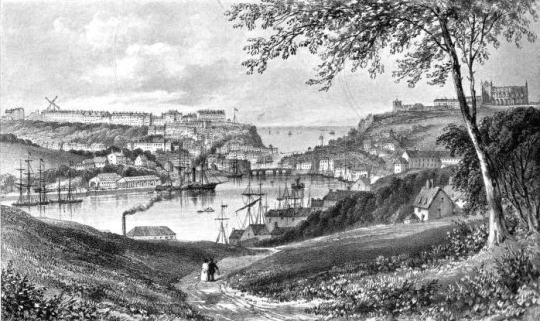
"The houses of the old town—the side away from us—are all red-roofed, and seem piled up one over the other anyhow..."
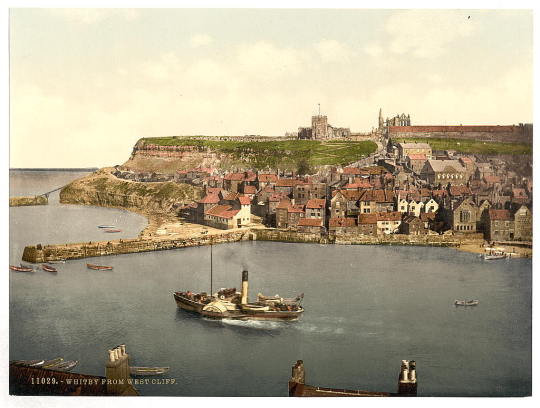
"... like the pictures we see of Nuremberg."
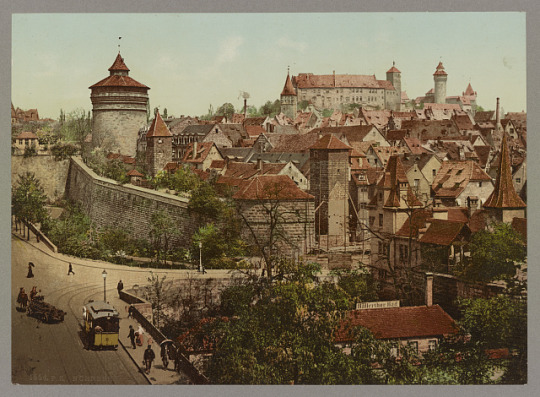
[this is Nuremberg sometime between 1890 and 1906]
"Right over the town is the ruin of Whitby Abbey, which was sacked by the Danes, and which is the scene of part of "Marmion," where the girl was built up in the wall."

"It is a most noble ruin, of immense size, and full of beautiful and romantic bits; there is a legend that a white lady is seen in one of the windows."
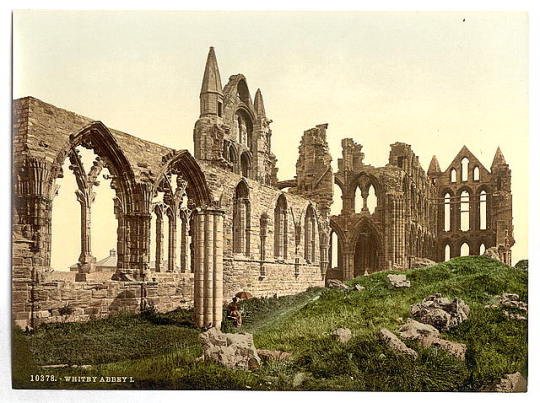
"Between it and the town there is another church, the parish one, round which is a big graveyard, all full of tombstones."
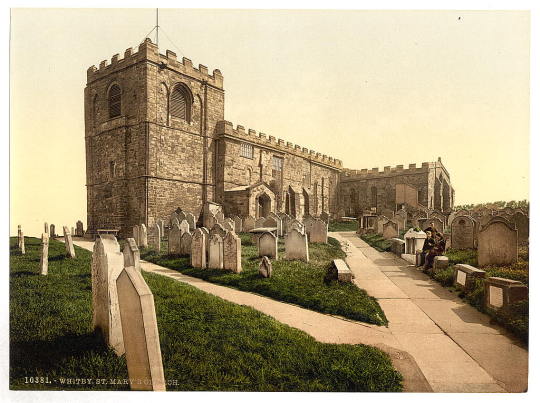
"This is to my mind the nicest spot in Whitby, for it lies right over the town, and has a full view of the harbour and all up the bay to where the headland called Kettleness stretches out into the sea."

"It descends so steeply over the harbour that part of the bank has fallen away, and some of the graves have been destroyed. In one place part of the stonework of the graves stretches out over the sandy pathway far below. There are walks, with seats beside them, through the churchyard; and people go and sit there all day long looking at the beautiful view and enjoying the breeze."
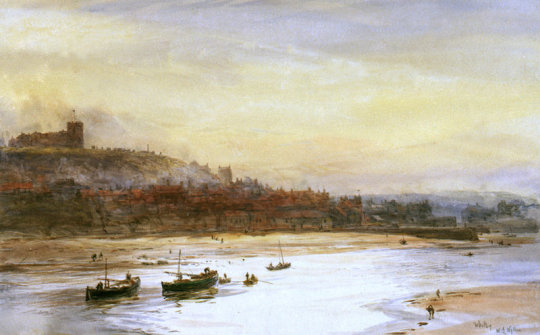
[this painting by William Lionel Wyllie is from 1922, so a bit later, but I thought it was too pretty not to include. St Mary's and the graveyard are at the top left, and you can see the steep descent below.]
"The harbour lies below me, with, on the far side, one long granite wall stretching out into the sea, with a curve outwards at the end of it, in the middle of which is a lighthouse. A heavy sea-wall runs along outside of it. On the near side, the sea-wall makes an elbow crooked inversely, and its end too has a lighthouse. Between the two piers there is a narrow opening into the harbour, which then suddenly widens."
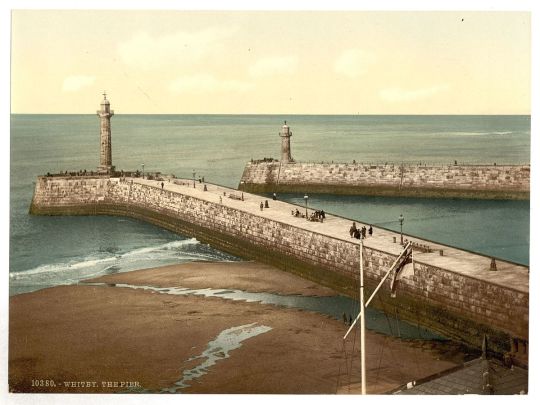
"It is nice at high water; but when the tide is out it shoals away to nothing, and there is merely the stream of the Esk, running between banks of sand, with rocks here and there."
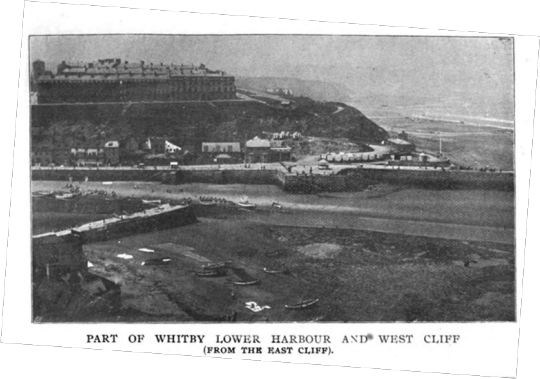
[from Horne's Guide to Whitby, 1897]
"Outside the harbour on this side there rises for about half a mile a great reef, the sharp edge of which runs straight out from behind the south lighthouse. At the end of it is a buoy with a bell, which swings in bad weather, and sends in a mournful sound on the wind. They have a legend here that when a ship is lost bells are heard out at sea."
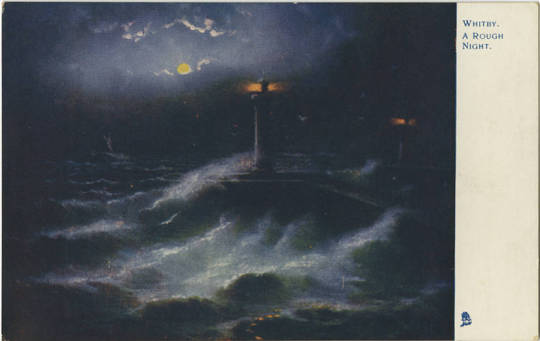
"The steps are a great feature on the place. They lead from the town up to the church, there are hundreds of them—I do not know how many—and they wind up in a delicate curve; the slope is so gentle that a horse could easily walk up and down them."

And a bonus - might Mina have bought one of these postcards for Jonathan?
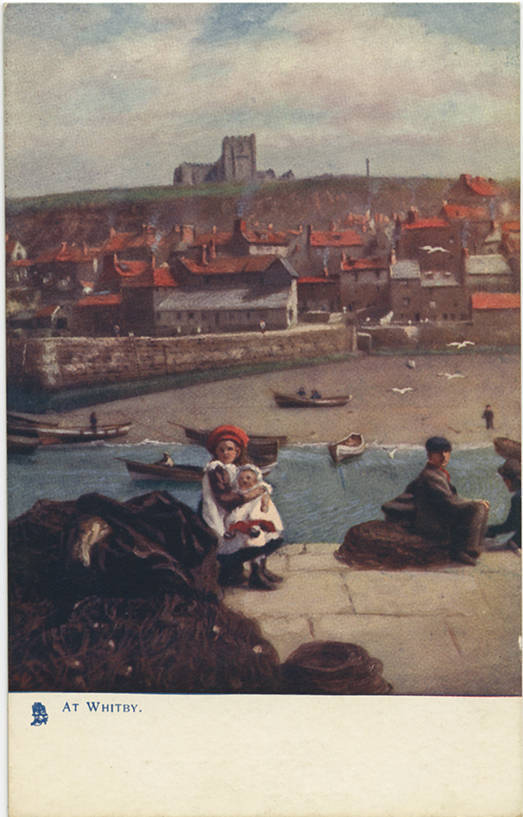
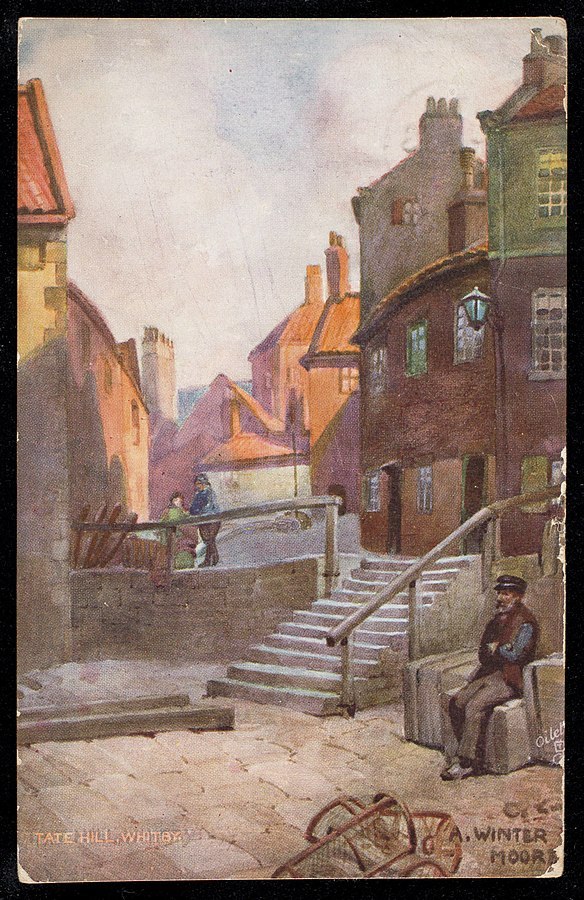
[they are from 1903, so the answer to this is "no", but again I thought they were too pretty not to include.]
#dracula daily#historical context#july 24#had this one in my drafts since may so i hope you all like it
413 notes
·
View notes
Text
Some thoughts after finishing the double that I need to expel from my consciousness:
1. I haven't enjoyed a show so much in a while. It had all the drama, and it didn't sacrifice it for the romance
2. Princess Wanning! She killed her dad and I think that was queen shit. She should have killed more people, frankly. She deserves to do so much murder
3. Shen Yurong how I hate you. This man is not only a murderer and a coward, he's also incompetent. None of his plans have ever worked. Mans couldn't manage to successfully kill his wife even if every god were on his side. I loved every time Xue Fangfei did psychic damage to him simply by existing
4. Xue Fangfei! Xue Li! Jiang Li! Xiao Limao! A'Li! Many other terms of address I've missed! She truly is that girl. She is gaslight gatekeep girl boss. She's a girl's girl. She stabbed a man in the dick 7 times. She has the man who once called her a pawn wrapped around her pinkie. When her man tells her he has to get into a political marriage for the nation she says do it then, and then he has to admit he was never gonna. She inflicted +9999999999999 damage on those who wronged her and Jiang Li. She can't fight to save her life (as evident) but can and will confuse her opponent into tripping over their own nonexistent shoelaces
5. I loved the progression of the relationship between A'Li and Xiao Heng. They weren't immediately lovers or friends. They fully used each other until they were willing to be used. The chemistry, the flirting, it's too much and too good. Also, Xiao Heng serves. See: the fans, the fucking gold plated murder fan, a walk-in closet full of capes, the most dramatic entrances known to cdramas, and all the audacity
6. BUT what were the last 20 minutes! They don't exist to me! My buddies Wen Ji and Lu Ji are watching their boss embarass himself at Duke Su's mansion and sharing in the hot goss, to me
7. Plus, I've gotta be missing something about the Longwu army. I do not understand them at all. Not a single one of them would survive the Nuremberg precedent. Not only are they not guided by ethics and morals, they're also not guided by loyalty or revenge or anger or hate or any understandable motivation. Instead, they're guided by a rock carving of a fish. wut. They find out the dude holding the fish works for the guy who betrayed and killed their general, their comrades, and even some of their family. And their response is: "How could they?!?!?! But we still have to listen to them because they have the fish!" Truly what. Someone explain this all-powerful rock fish to me
8. I do think that the Jiangs deserved more. And by more I mean worse. I think Xue Li should have told Jiang Yuanbai exactly how Jiang Li lived and died, and that she hated him for his negligence. I think she should have told the grandma too. They had their hand in this and they deserve to feel the full weight of Jiang Li's life and death and hatred
9. Also Jiang Yuanbai being like "It's not that I didn't know what was going on at home it's just that I was so busy working for the nation uwu". Sir, disrespectfully, no. You had not a clue. And if you did, that makes it worse. Like "Oh no! I'm so busy working that I have no choice but to let my wife frame my 8 yr old for her own attempted murder! The murder of the same stepmom that she, until yesterday, adored! Oh well, I gotta go to work so I'll just let that happen and abandon her for 10 years until politics makes it necessary for me to bring her home! And I'll feel really bad about abandoning her now, but I'll also never believe a single word out her mouth!" Actually, I think he should be hunted for sport
10. Anyway, that got off track! But I love this show, and how even the antagonists have arcs and backstories and aren't countering our girl just cuz. I love the fleshed out characters, all the looks it serves, the drama, and the adorable Wen Ji and Lu Ji and Jiang Jingrui
#the double#princess wanning#shen yurong#xue fangfei#xue li#jiang li#xiao heng#wen ji#lu ji#❤️#longwu army#and their fucking magic rock fish god#jiang yuanbai
46 notes
·
View notes
Text
Doctors have always used patients for medical experiments often without their informed consent. Dr. Vernon Coleman gives a few tips on how you can tell if your doctor is experimenting on you.
Despite the horrors of well-known incidences in the past such as the experiments carried out on prisoners before and during World War II in Nazi Germany and Japan, the CIA’s MKUltra project which began in the 1950s and British teaching hospitals in the 1960s treating their patients with as much respect as lab rats (and sometimes killing them in the process), doctors experimenting on patients without their knowledge continues to this day.
In the USA, for example, the Alliance For Human Research Protection noted that “since the FDA issued a waiver of informed consent for emergency research, there have been at least 41 trials involving 46,964 patients. Of these, 96% were enrolled without their knowledge or informed consent.”
In 2017, American historian of medicine Alice Dreger wrote an article titled ‘You might be in a medical experiment and not even know it’ in which she cites examples in America of experimentation on patients without their knowledge. She wrote:
Today, more and more medical experimenters in the United States appear to circumvent getting the voluntary, informed consent of those whose bodies are being used for research. What’s more, rather than fighting this retrograde trend, some of the most powerful actors in medical research are defending it as necessary to medical progress. The tenets of the Nuremberg Code were not meant only for Nazis. If Nazis presented the only danger to people being used for medical experiments, eliminating the Nazis would have solved our problems. The Nuremberg Code was written to guide all of us, because good intentions are not enough.
14 notes
·
View notes
Text
Reinhard Heydrich, Heinrich Himmler, Hans Michael Frank, Werner Best and Kurt Daluege in the Police Law Committee.
So basically a bunch of hateful, murderous, asshats being hateful, murderous, asshats.
Although, the Moose Sized nazi looks like he is photobombing in the pic.
Let's talk about Hans Michael Frank. He seems to be another one that isn't talked about often.
After the German invasion of Poland in 1939, Frank was appointed Governor-General of the occupied Polish territories. During his tenure, he instituted a reign of terror against the civilian population and became directly involved in the mass murder of Jews. He engaged in the use of forced labour and oversaw four of the extermination camps. Frank remained head of the General Government until its collapse in early 1945. During that time, over 4 million people were murdered under his jurisdiction.
Frank was captured by American troops on 4 May 1945, at Tegernsee in southern Bavaria. He attempted suicide twice. He was indicted for war crimes and tried before the International Military Tribunal in Nuremberg from 20 November 1945 to 1 October 1946. During the trial he converted, guided by Fr Sixtus O'Connor OFM, to Roman Catholicism, and claimed to have had a series of religious experiences.
Frank voluntarily surrendered 43 volumes of his personal diaries to the Allies, believing his struggles against other Nazi officials would be enough to secure his defence. Oops?
Which were then used against him as evidence of his guilt. Frank confessed to some of the charges, and testified in response to questions from his defence attorney:
"after having heard the testimony of the witness Rudolf Höss, my conscience does not allow me to throw the responsibility solely on these minor people. I myself have never installed an extermination camp for Jews, or promoted the existence of such camps; but if Adolf Hitler personally has laid that dreadful responsibility on his people, then it is mine too, for we have fought against Jewry for years; and we have indulged in the most horrible utterances."
During his captivity, he penned a series of letters in which he also left his last thoughts. To his son Norman, he wrote that he preferred to die and join the "brave soldiers, who were (...) killed in this war" than "be dealt in revenge from [migrants], traitors", from those such as Willy Brandt.
During their trials, he and Albert Speer were the only defendants to show any degree of remorse for their crimes. Though, according to his son Niklas, he portrayed himself as a "man of the law", and was not personally acknowledging guilt, rather shifting it to the "German people" as a whole.
At the same time, he accused the Allies, especially the Soviets, of their own wartime atrocities. Frank was found guilty of war crimes and crimes against humanity on 1 October 1946 and was sentenced to death by hanging.
The death sentence was carried out at Nuremberg Prison on 16 October by US Army Master Sergeant John C. Woods.
Niklas Frank has done many interviews about the horrific deeds of his father. Including, talks at Auschwitz. I highly recommend looking for him on YouTube or other video sites.

#wwii era#ww2 history#ww2#ww2 germany#wwii#wwii germany#3rd reich#reichblr#nuremburg trials#hans frank
9 notes
·
View notes
Text



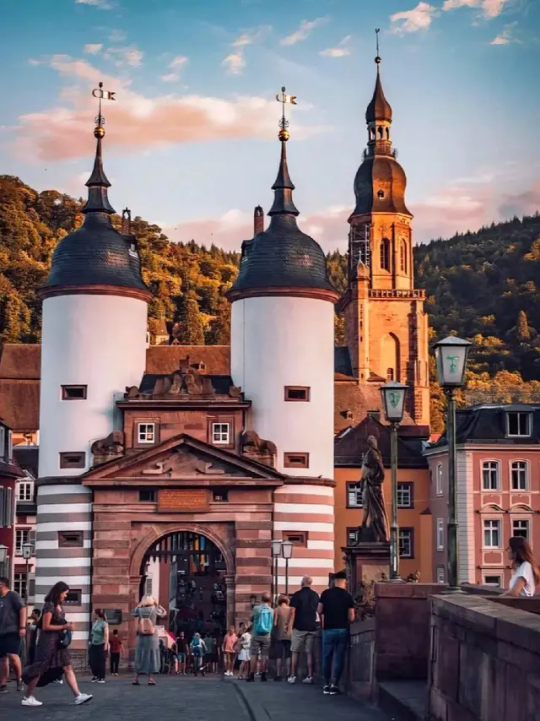
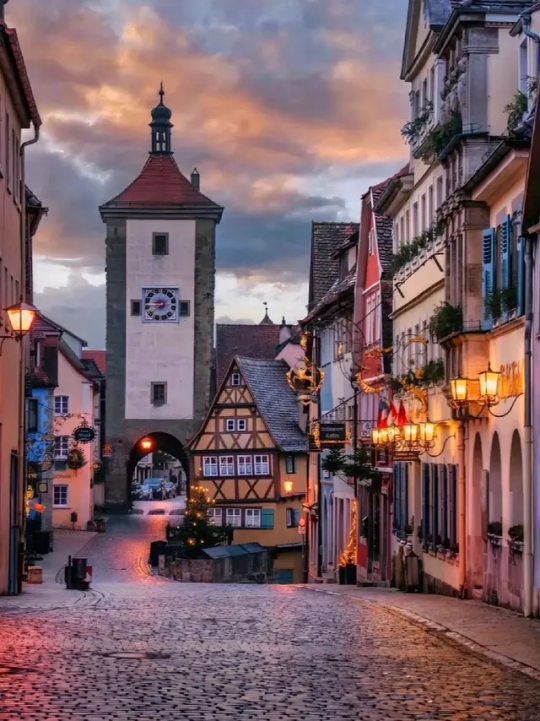




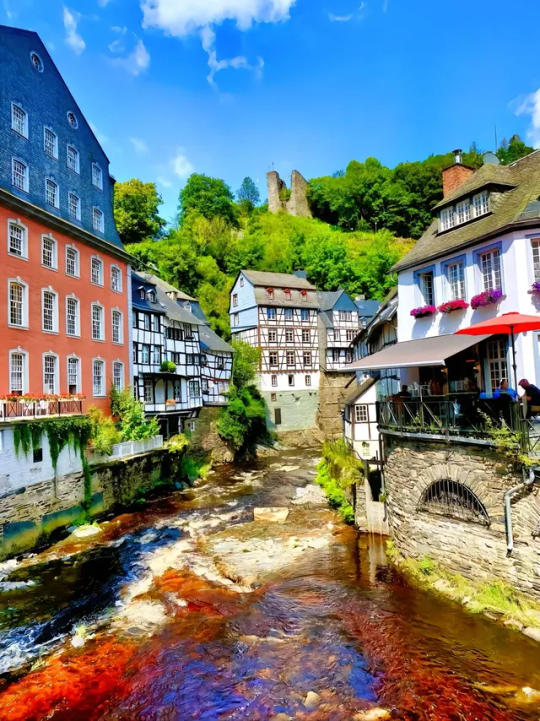


Germany 🇩🇪 Around Munich 9️⃣ Travel Destinations Full Guide Euro 2024 in Germany is in full swing, and Munich, Germany is no stranger to anyone because of the beautiful King's Lake, the fantastic Neuschwanstein Castle, the fairytale town of
🌟Tourist Routes around Munich Suggested route: Frankfurt → Wuzburg → Rothenburg → Nuremberg → Munich → King's Lake → Neuschwanstein → Constance → Lake Titi → Black Forest → Baden-Baden → Heidelberg → Frankfurt
🌟 ➕Trains with driving Convenient by train: Rothenburg, Nuremberg, Munich, King's Lake, Neuschwanstein, Baden-Baden, Heidelberg ▪Convenient by car: Black Forest town
1️⃣ Frankfurt - international flights landing and taking off 🌟 Recommended 1~3 days 🌟 downtown + mall shopping takes a full day, if you have more time, go to Mainz, Hanau day trip and back
2️⃣ Rothenburg - romantic little Europe with medieval flavor 🌟1~2 days 🌟 Take a walk along the centuries-old city walls, weaving through the old town's city hall, Prenlei's small square, Castle Park and other Rothenburg attractions, and feel the beauty of the Gothic Renaissance!
3️⃣ Nuremberg - the old Christmas market is here! 🌟1~3 days 🌟 Visit a museum, have lunch, and you can see all the sights on a day trip walking tour!
4️⃣ Munich - BMW World HQ, beer, palaces! 🌟1~4 days 🌟 Stroll through the Old Town and experience Munich-style life and passion; Art and Leisure Tour Museum Literary Control Look Over; Sports Fans Sports Tour Pilgrimage to Bayern Football Stadium
5️⃣King's Lake - a paradise on earth surrounded by the Alps 🌟1~2 days 🌟 Surrounded by the Alps and becomes a lake. Recognized as Germany's Wonderland on Earth
6️⃣ Neuschwanstein Castle - European medieval dream fairy tale castle 🌟1 day. 🌟 Fantasies of fairytale castles inspired Disney's Sleeping Beauty Castle
7️⃣ Lake Titi, Black Forest Town - a mysterious fairytale forest 🌟3~7 days 🌟 The Black Forest is really oversized, and it must be shocking to visit it for the first time
8️⃣ Baden-Baden - a spa for the rich! 🌟1~2 days 🌟 Famous spa resort, tourist destination and international conference city in the Black Forest, with a beautiful view of the mountains and the water
9️⃣ Heidelberg 🌟1~5 days 🌟 If you love the academic atmosphere and youthful energy of a university town, a few days in Heidelberg is really not enough!
12 notes
·
View notes
Text
The Pocket Guide to Nuremberg's Best Countyside Breweries

#beer#hiking#bavaria#beer_wanderers#brewery#bier#beerwanderers#beer hiking bavaria#franconia#franken#Nürnberg#Nuremberg
6 notes
·
View notes
Text
youtube
Welcome to Nexth City iRadio 2023 - Christmas Music Special Edition, Episode 2, the enchanting Nuremberg, Germany, on December 20. Join DJ Laurinda for a musical journey inspired by the story of Angel Gabriel.
Featuring Francesco D'Andrea, Will Taylor, Salt of the Sound, and more, this festive episode promises a unique Christmas playlist. DJ Laurinda's charisma will guide you through the immersive experience.
Let Nexth City iRadio be your soundtrack to a holiday season where tradition meets innovation, and music becomes the magic of Christmas.
#music#radio#DJLaurinda#Christmas#MerryChristmas#happynewyear#happynewyear2024#greeting#INXA#nexth#nexthcity#wave#party#remix#Youtube
2 notes
·
View notes
Text
Another day of lots of driving. Firstly, we stopped for a few hours in Nuremberg. Besides being heavily bombed in WW11, it is a beautiful city full of wonderful buildings



Crossed another border into Czechia or the Czech Republic. Did a walking tour with a local guide and discovered the new old city or is that the old new city🤷🏻♀️Couldn’t quite get that explanations




Spending two days here in Prague now. We’ll be going on a guided tour of the castles and a lunch cruise down the Danube
Our group

3 notes
·
View notes
Text
Thank you so much, Japan!

Thirty years ago today, I stood at Nuremberg Airport with my mother and a large group of friends from my former research institute. I said a woeful goodbye to everyone and then boarded a plane bound for Tokyo. I still remember the painful worry of leaving behind, for at least a year, all the familiar surroundings and daily rituals of home, departing for a strange place I knew almost nothing about. The dreadful feelings intensified as the plane left the runway and climbed, but the moment it pierced through the thick gray clouds, with sunlight flooding in, my worries miraculously disappeared.
They were replaced by a spirit of adventure and a deep trust in fate. Suddenly, I was confident that I would somehow survive my employment as a postdoctoral physicist at Tokyo University. And then, after my return to Germany, I would be able to tick this important box on my academic CV, indicating that I had worked for an extended period in a prestigious foreign research institute. It was just a necessary step in my career, I thought—without knowing yet that Japan would become a beloved country for me, and that my many bonds to it would have nothing to do with science or job opportunities.
The very first person I met after walking out of the baggage claim at Narita Airport was the Japanese secretary of my new research institute, who had kindly come to pick me up. In fact, it did not take long for us to become friends — the start of a genuine friendship that has lasted for three decades now, with daily conversations, despite us living in different countries for nearly all that time. So fate had indeed guided me, quite literally, from the moment I stepped out of my familiar life into the strange land of the rising sun.
Thanks to my Japanese friend, and in her great company through more than 20 subsequent holidays after my residence in Tokyo had ended, I was able to explore this remarkable culture.
To some extent, I had studied the Zen Buddhist past of Japan even before my first arrival, and it was this spiritual aspect that made me choose Japan — not really a place known for advancing the careers of physicists - for my "obligatory" stay abroad.
But what truly enchanted me about this country was the living, present culture of its people: their friendliness, correctness, and sincerity; their deep understanding and appreciation of arts and music; the high level of their craftsmanship; and, above all, the fantastic variety and quality of Japan’s food, as well as the beauty of its nature.
I am infinitely grateful that I had the opportunity to experience Japan in so many life-enhancing ways: hiking through stunningly beautiful forests with hidden waterfalls, around clear lakes, and along wild rivers, visiting countless temples and shrines along the way.
I am grateful for the unbelievable food I was served in Japan, such as the multi-course kaiseki menus, where each course was a pleasant surprise for the eyes, mouth, and nose, and where each dish kept surpassing the last - until I was moved to tears because the taste was simply otherworldly, delicious, and refined.
I am grateful for the hot onsens, where I could relax while watching the Zen garden around me.
But most of all, I am grateful for having spent some of the happiest and most uplifting moments of my entire life in the jazz club 'Sometime' in Kichijoji, Tokyo. Its entire atmosphere - the close proximity to the musicians, the various bands where each member was not only a fantastic artist but also an authentic human being, the cool but deeply music-loving audience, the never-changing friendly staff, and the great food - this combination comes close to paradise for me.
Thank you, Japan, for all of this!
I hope you will endure far into the future of this planet, so that fate can guide my way back to you - every single time I am reborn in human form.
Claus Metzner, March 3, 2025.
--------------------------------------------
Slideshow:
Memories of Japan
--------------------------------------------
Jazz Club 'Sometime':

0 notes
Text
tagged by @punchelf, tagging @pellaaearien, @driftward, @saesama, @scrollsfromarebornrealm (feel free to answer on main blogs if applicable I'm just terrible at keeping track of 'em)
last song: Moonlight Guide Us - Hades II soundtrack
favorite color: PURPLE! especially that deep, rich, slightly-blue-leaning violet of a really nice amethyst geode
last book: uhhh, finished, I'll Be Gone in the Dark by Michelle McNamara. currently slogging through, On the Farm by Stevie Cameron. (trying to get more nonfiction in my diet, and I find true crime easier to parse via audiobook. love my Libby app.)
last movie: Judgment at Nuremberg (1961); I really enjoy older films and "classic" Hollywood pictures, plus TCM is doing its big ticket film blitz before the Oscars, so I had this playing while I worked today, and it is a very good movie. please do watch it if you're able.
last tv show: Time Team; it's one of my favorite things to find a playlist of and have going in the background on my laptop in the evening, fun listening and great archaeology!
last thing I searched for online: "max scherzer team" - I was chatting with one of my friends about the new pitch call system MLB is testing in spring training and I couldn't remember what fucking team Scherzer was playing for this season
current obsession: Hades II, the Warsong Update has me by the throat and I'm having fun testing out the tweaks to the weapons and the new builds I can make with Ares in the Boon-gifting lineup and also DECORATING THE CROSSROADS *vibrating*
looking forward to: April, heading to Atlanta for the pen show and to hang out with friends then! *excited bongo*
4 notes
·
View notes